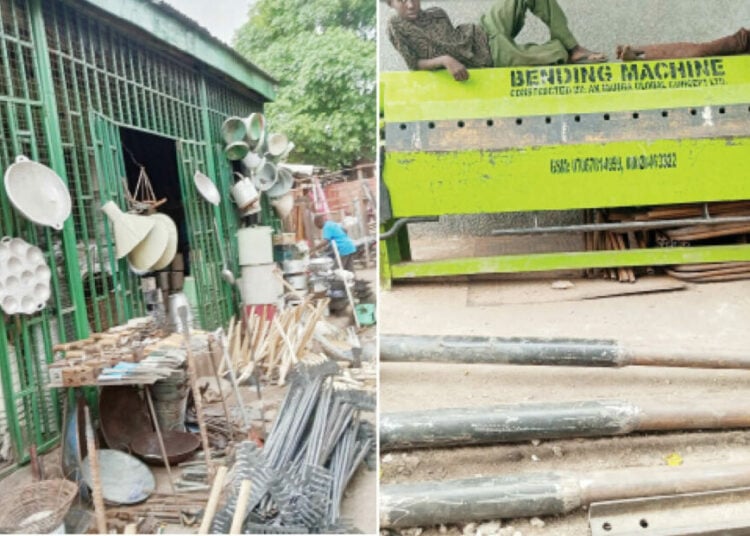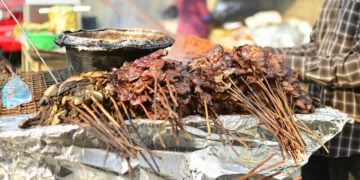In the crowds of Gombe Central Market, where vehicles’ horns jab the air and traders haggle in bursts, another sound cuts through.
Yet, Malam Ibrahim Makeri, one of the oldest craftsmen in the centre cares a little or not at all. He also produces additional sounds that linger in the air. They are sounds of metal against metal that came from wooden makeshifts where he does his blacksmithing.
Sitting beside his forge, Ibrahim fans the fire with a traditional leather bellows, a skill passed down for generations. His workshop is modest: a pile of scrap, a melting pot, and a hammer worn by decades of use. From these tools, he produces farming hoes, knives, cutlasses and many things.
This has become his lifeline. Wiping sweat from his forehead, he said, “I married, sustained my family, and educated my children through blacksmithing.”
For centuries, Gombe’s blacksmiths have been essential to farming and domestic life. Even today, where agriculture employs most of the population, demand remains steady. In recent years, they expanded, fabricating modern tools, spare parts, streetlight poles, and even hospital beds.
But the craft is under pressure, they said. Rising costs of scrap and charcoal, irregular electricity, and factory-made imports threaten livelihoods, according to Usman Hassan Adamu, the Sarkin Mekera (traditional leader of blacksmiths.
“Our products are more durable than imported ones. We even reconstruct modern materials into stronger versions. Industries copy our designs, but we lack capital and equipment to compete,” he told LEADERSHIP.
The Bank of Industry estimates that Nigeria has over 12 million artisans who form the backbone of grassroots enterprise and cultural preservation. Yet, most work informally, without access to finance or training. Reports show that over 70% of rural artisans lack technical or financial support, forcing many to rely on ageing tools.
Young Men at the Forge
Despite these constraints, younger generations are keeping the tradition alive. At 28, Mohammed Musa has completed his apprenticeship and now earns between N30,000 and N40,000 monthly. “It is not much, but it is honest. I construct what people use daily, and I feel okay.”
Another smith, Usman Mohammed (Balale), said the business has paid off. “I married, built a house, and pay my children’s school fees through it. We now construct grinding engines, spares, and even modern equipment. What we need is capital and better machines.”
The smiths’ stories reveal an ecosystem that extends beyond the forges. Scrap dealers, charcoal sellers, welders, and retailers all depend on the blacksmithing trade, supporting thousands of families.
A Hub of Livelihoods
The Sarkin Mekera estimates that over 5,000 blacksmiths, with over 2000 youths operate in the centre. Each year, university graduates and school leavers join the craft when white collar jobs remain scarce.
“This year alone, five graduates who just finished NYSC joined us. If the government supports us with equipment, we can do wonders.”
But he also raised concerns about the heavy use of charcoal, which accelerates deforestation. He urged authorities to provide cleaner alternatives.
Musa Abdulhamid, a 52-year-old dealer who began smithing at 14, lamented that the craft has stagnated in Nigeria while advancing elsewhere. “We have talent, but we lack buyers and equipment,” he said.
Chindo Baba, Chairman of the Makera Progressive Association, listed the wide range of items they produce. “We construct wheelbarrows, trailer body parts, and bending engines. Our biggest challenges are capital, stable power, and access to generators.”
Government Response
According to Gombe state’s Commissioner for Trade, Industry and Tourism, Nasiru Mohammed, the state has taken steps to ease their burdens. He cited improved feeder roads, better security, and quick interventions during crises, such as a recent fire outbreak that destroyed workshops.
Nasiru Mohammed, Gombe State Commissioner for Trade, Industry and Tourism
He revealed plans to relocate the forge to a safer and modern site, also highlighted a digital platform where artisans can advertise products for N1,000 annually. Through GoCARES, he said, artisans can also access operational grants and interest-free loans.
Mohammed noted that Gombe has ranked first on Nigeria’s Ease of Doing Business index since 2020, crediting Governor Inuwa Yahaya’s policies.
The Gap Between Policy and Practice
For the smiths, such policies are welcome but often slow to reach the ground. Most workshops still depend on muscle power when electricity fails, and banks often demand high collateral before releasing loans.
The Sarkin Mekera believes targeted support would transform the sector. “With modern equipment and loans, this story would change”.
The blacksmiths provide jobs, sustain rural life, and preserve heritage. Yet, their survival depends on bridging the gap between small workshops and big policies, including access to finance, modern machines, stable electricity, and expanded markets.
Now, the talent is there. The fire still burns in the forges. The questions are whether the fires will fade to ashes or inspire a new industrial dawn, and whether only magic can close the gap, and when?





